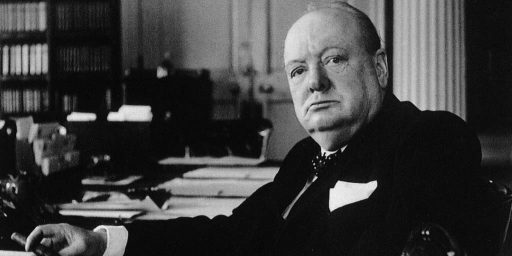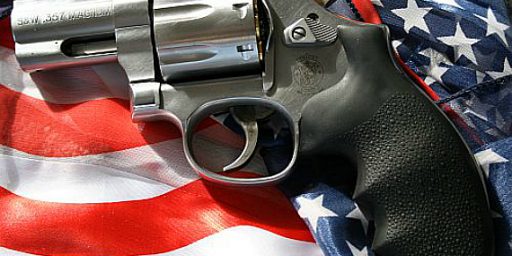Bush and Churchill
Andrew Sullivan makes the interesting observation that
Wartime leaders have always faced the worst fear: defeat in battle. But in democracies at least, war leaders also confront another danger: success. The qualities that make for great statesmanship in wartime — determination, a single focus on victory, a black-and-white conviction of who is friend or foe — can often seem crude or overbearing when peace comes around. The most dramatic example of this in Western history is Winston Churchill. It is no exaggeration to say that without him, Britain may well have been destroyed by Hitler. He was the difference between victory and defeat. But almost the minute that victory was declared, the voters turned on their hero. He lost the postwar election. Even more striking, he lost it in one of the biggest landslides in Britain’s parliamentary history. He wasn’t just defeated. He was buried.
I wonder if the lesson of Churchill now haunts the office of Bush political strategist Karl Rove. For something not completely dissimilar seems to be happening to George W. Bush. Since just after the capture of Saddam, Bush’s ratings have been slumping. And this is less surprising than it appears. The paradox of the war against terrorism is that the more the President succeeds, the more politically vulnerable he gets. The fewer the terrorist incidents, the more remote the fear, the less necessary the war seems and the more dispensable the war President appears. If he responds to this by insisting that the enemy is still powerful and dangerous, he runs the risk of seeming to concede that he hasn’t managed to curtail the threat. Or, worse perhaps, it seems as if he’s whipping up fear and panic for his own electoral advantage. And after the failures of intelligence with respect to weapons of mass destruction in Iraq, Bush’s credibility on unknown threats is already eroded.




I remember distinctly from his most recent interview: “I am a wartime president.”
Which immediately prompted the question in my mind: “What condition would this country be in if 9-11 hadn’t happened?”
How’s that for a discussion topic?
After Saddam’s capture maybe it took people a few days but then they realized that Saddam didn’t cause 9/11 and their jubilation subsided.
The “war” was on terrorism but more and more folks are wondering how Al Queda keeps getting into the news if we’ve won the war in Iraq.
It gives Bush way too much credit to compare invading Iraq with Churchill’s role in defeating Hitler and the Axis Powers.
Who said/thought Saddam caused 9/11?!
I think carsick is referring to some surveys that seemed to show that around half of those polled thought Iraq and/or Saddam had a direct hand, or was an accomplice in, 9/11. I’ll see if I can dig up links.
Clever fellow, but I think he’s overthinking things. Is the President’s retreat in the polls the result of Saddam’s anti-climatic capture or the blanket coverage of the Democratic primary and the ceaseless criticism of the Presidency that entails? The pots are still boiling in Iraq, Iran, Afghanistan, Pakistan and perhaps even Syria – the President will not have to insist on or whip up anything. The enemy can be relied upon to demonstrate that the war is still on.
This parallel is, though, is quite a stretch.In 1945, Britain was not only exhausted not only from six years of total war, but also from the Great Depression, the unrest of the 20’s and WWI. Further, there was no doubt the WWII was certainly over and that the United States would now make good on it’s promise to guarantee a world order that would allow Britain to safely turn away from empire and look inward. America is no such position. Still the leader of the global economy, events will prove that the war is not over, and there is no saviour to allow America to hang up it’s guns and go home.
I wonder if Mr. Sullivan is wishing for the best of both worlds. That victory over the Islamists is now so advanced that even a Democrat could screw it up. That the President will pay for that success with his office. That a Democrat should take the White House that is amenable to gay marriage.
—